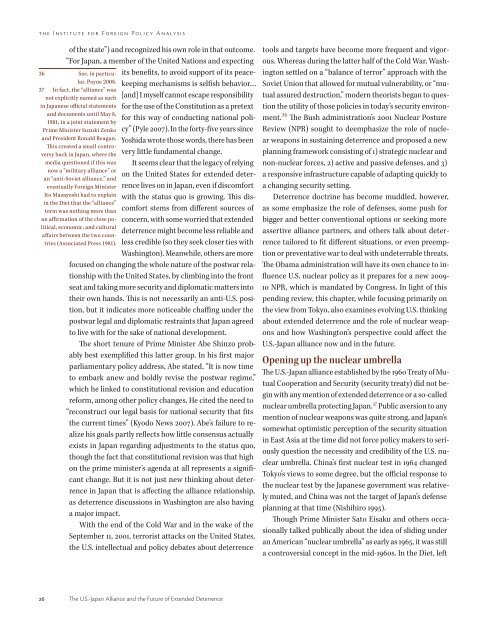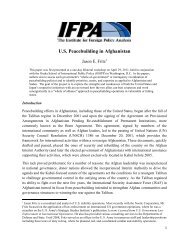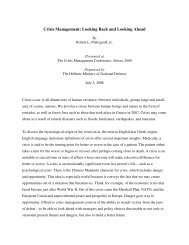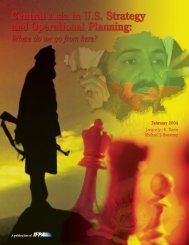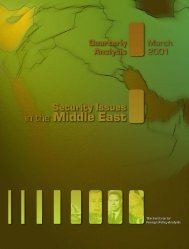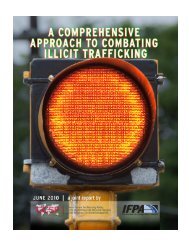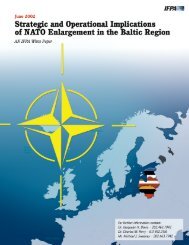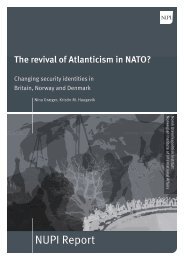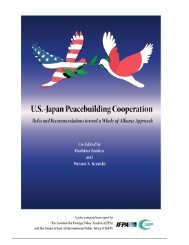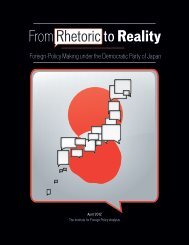Realigning Priorities: The U.S.-Japan Alliance and the Future of ...
Realigning Priorities: The U.S.-Japan Alliance and the Future of ...
Realigning Priorities: The U.S.-Japan Alliance and the Future of ...
You also want an ePaper? Increase the reach of your titles
YUMPU automatically turns print PDFs into web optimized ePapers that Google loves.
t h e I n s t i t u t e f o r F o r e i g n P o l i c y A n a ly s i s<br />
<strong>of</strong> <strong>the</strong> state”) <strong>and</strong> recognized his own role in that outcome.<br />
“For <strong>Japan</strong>, a member <strong>of</strong> <strong>the</strong> United Nations <strong>and</strong> expecting<br />
36 See, in particular,<br />
Payne 2008.<br />
37 In fact, <strong>the</strong> “alliance” was<br />
not explicitly named as such<br />
in <strong>Japan</strong>ese <strong>of</strong>ficial statements<br />
<strong>and</strong> documents until May 8,<br />
1981, in a joint statement by<br />
Prime Minister Suzuki Zenko<br />
<strong>and</strong> President Ronald Reagan.<br />
This created a small controversy<br />
back in <strong>Japan</strong>, where <strong>the</strong><br />
media questioned if this was<br />
now a “military alliance” or<br />
an “anti-Soviet alliance,” <strong>and</strong><br />
eventually Foreign Minister<br />
Ito Masayoshi had to explain<br />
in <strong>the</strong> Diet that <strong>the</strong> “alliance”<br />
term was nothing more than<br />
an affirmation <strong>of</strong> <strong>the</strong> close political,<br />
economic, <strong>and</strong> cultural<br />
affairs between <strong>the</strong> two countries<br />
(Associated Press 1981).<br />
its benefits, to avoid support <strong>of</strong> its peacekeeping<br />
mechanisms is selfish behavior…<br />
[<strong>and</strong>] I myself cannot escape responsibility<br />
for <strong>the</strong> use <strong>of</strong> <strong>the</strong> Constitution as a pretext<br />
for this way <strong>of</strong> conducting national policy”<br />
(Pyle 2007). In <strong>the</strong> forty-five years since<br />
Yoshida wrote those words, <strong>the</strong>re has been<br />
very little fundamental change.<br />
It seems clear that <strong>the</strong> legacy <strong>of</strong> relying<br />
on <strong>the</strong> United States for extended deterrence<br />
lives on in <strong>Japan</strong>, even if discomfort<br />
with <strong>the</strong> status quo is growing. This discomfort<br />
stems from different sources <strong>of</strong><br />
concern, with some worried that extended<br />
deterrence might become less reliable <strong>and</strong><br />
less credible (so <strong>the</strong>y seek closer ties with<br />
Washington). Meanwhile, o<strong>the</strong>rs are more<br />
focused on changing <strong>the</strong> whole nature <strong>of</strong> <strong>the</strong> postwar relationship<br />
with <strong>the</strong> United States, by climbing into <strong>the</strong> front<br />
seat <strong>and</strong> taking more security <strong>and</strong> diplomatic matters into<br />
<strong>the</strong>ir own h<strong>and</strong>s. This is not necessarily an anti-U.S. position,<br />
but it indicates more noticeable chaffing under <strong>the</strong><br />
postwar legal <strong>and</strong> diplomatic restraints that <strong>Japan</strong> agreed<br />
to live with for <strong>the</strong> sake <strong>of</strong> national development.<br />
<strong>The</strong> short tenure <strong>of</strong> Prime Minister Abe Shinzo probably<br />
best exemplified this latter group. In his first major<br />
parliamentary policy address, Abe stated, “It is now time<br />
to embark anew <strong>and</strong> boldly revise <strong>the</strong> postwar regime,”<br />
which he linked to constitutional revision <strong>and</strong> education<br />
reform, among o<strong>the</strong>r policy changes. He cited <strong>the</strong> need to<br />
“reconstruct our legal basis for national security that fits<br />
<strong>the</strong> current times” (Kyodo News 2007). Abe’s failure to realize<br />
his goals partly reflects how little consensus actually<br />
exists in <strong>Japan</strong> regarding adjustments to <strong>the</strong> status quo,<br />
though <strong>the</strong> fact that constitutional revision was that high<br />
on <strong>the</strong> prime minister’s agenda at all represents a significant<br />
change. But it is not just new thinking about deterrence<br />
in <strong>Japan</strong> that is affecting <strong>the</strong> alliance relationship,<br />
as deterrence discussions in Washington are also having<br />
a major impact.<br />
With <strong>the</strong> end <strong>of</strong> <strong>the</strong> Cold War <strong>and</strong> in <strong>the</strong> wake <strong>of</strong> <strong>the</strong><br />
September 11, 2001, terrorist attacks on <strong>the</strong> United States,<br />
<strong>the</strong> U.S. intellectual <strong>and</strong> policy debates about deterrence<br />
tools <strong>and</strong> targets have become more frequent <strong>and</strong> vigorous.<br />
Whereas during <strong>the</strong> latter half <strong>of</strong> <strong>the</strong> Cold War, Washington<br />
settled on a “balance <strong>of</strong> terror” approach with <strong>the</strong><br />
Soviet Union that allowed for mutual vulnerability, or “mutual<br />
assured destruction,” modern <strong>the</strong>orists began to question<br />
<strong>the</strong> utility <strong>of</strong> those policies in today’s security environment.<br />
36 <strong>The</strong> Bush administration’s 2001 Nuclear Posture<br />
Review (NPR) sought to deemphasize <strong>the</strong> role <strong>of</strong> nuclear<br />
weapons in sustaining deterrence <strong>and</strong> proposed a new<br />
planning framework consisting <strong>of</strong> 1) strategic nuclear <strong>and</strong><br />
non-nuclear forces, 2) active <strong>and</strong> passive defenses, <strong>and</strong> 3)<br />
a responsive infrastructure capable <strong>of</strong> adapting quickly to<br />
a changing security setting.<br />
Deterrence doctrine has become muddled, however,<br />
as some emphasize <strong>the</strong> role <strong>of</strong> defenses, some push for<br />
bigger <strong>and</strong> better conventional options or seeking more<br />
assertive alliance partners, <strong>and</strong> o<strong>the</strong>rs talk about deterrence<br />
tailored to fit different situations, or even preemption<br />
or preventative war to deal with undeterrable threats.<br />
<strong>The</strong> Obama administration will have its own chance to influence<br />
U.S. nuclear policy as it prepares for a new 2009-<br />
10 NPR, which is m<strong>and</strong>ated by Congress. In light <strong>of</strong> this<br />
pending review, this chapter, while focusing primarily on<br />
<strong>the</strong> view from Tokyo, also examines evolving U.S. thinking<br />
about extended deterrence <strong>and</strong> <strong>the</strong> role <strong>of</strong> nuclear weapons<br />
<strong>and</strong> how Washington’s perspective could affect <strong>the</strong><br />
U.S.-<strong>Japan</strong> alliance now <strong>and</strong> in <strong>the</strong> future.<br />
Opening up <strong>the</strong> nuclear umbrella<br />
<strong>The</strong> U.S.-<strong>Japan</strong> alliance established by <strong>the</strong> 1960 Treaty <strong>of</strong> Mutual<br />
Cooperation <strong>and</strong> Security (security treaty) did not begin<br />
with any mention <strong>of</strong> extended deterrence or a so-called<br />
nuclear umbrella protecting <strong>Japan</strong>. 37 Public aversion to any<br />
mention <strong>of</strong> nuclear weapons was quite strong, <strong>and</strong> <strong>Japan</strong>’s<br />
somewhat optimistic perception <strong>of</strong> <strong>the</strong> security situation<br />
in East Asia at <strong>the</strong> time did not force policy makers to seriously<br />
question <strong>the</strong> necessity <strong>and</strong> credibility <strong>of</strong> <strong>the</strong> U.S. nuclear<br />
umbrella. China’s first nuclear test in 1964 changed<br />
Tokyo’s views to some degree, but <strong>the</strong> <strong>of</strong>ficial response to<br />
<strong>the</strong> nuclear test by <strong>the</strong> <strong>Japan</strong>ese government was relatively<br />
muted, <strong>and</strong> China was not <strong>the</strong> target <strong>of</strong> <strong>Japan</strong>’s defense<br />
planning at that time (Nishihiro 1995).<br />
Though Prime Minister Sato Eisaku <strong>and</strong> o<strong>the</strong>rs occasionally<br />
talked publically about <strong>the</strong> idea <strong>of</strong> sliding under<br />
an American “nuclear umbrella” as early as 1965, it was still<br />
a controversial concept in <strong>the</strong> mid-1960s. In <strong>the</strong> Diet, left<br />
26<br />
<strong>The</strong> U.S.-<strong>Japan</strong> <strong>Alliance</strong> <strong>and</strong> <strong>the</strong> <strong>Future</strong> <strong>of</strong> Extended Deterrence


